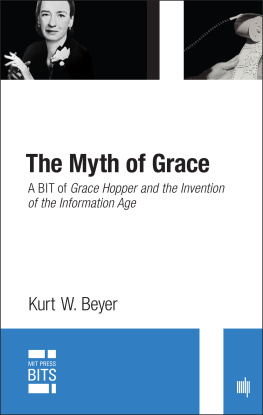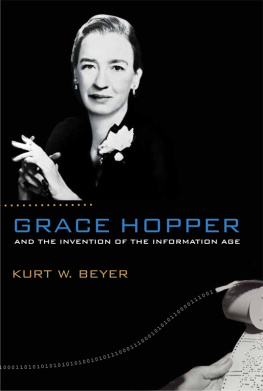Kurt W. Beyer - Myth of Grace
Here you can read online Kurt W. Beyer - Myth of Grace full text of the book (entire story) in english for free. Download pdf and epub, get meaning, cover and reviews about this ebook. year: 2013, publisher: The MIT Press, genre: Romance novel. Description of the work, (preface) as well as reviews are available. Best literature library LitArk.com created for fans of good reading and offers a wide selection of genres:
Romance novel
Science fiction
Adventure
Detective
Science
History
Home and family
Prose
Art
Politics
Computer
Non-fiction
Religion
Business
Children
Humor
Choose a favorite category and find really read worthwhile books. Enjoy immersion in the world of imagination, feel the emotions of the characters or learn something new for yourself, make an fascinating discovery.
- Book:Myth of Grace
- Author:
- Publisher:The MIT Press
- Genre:
- Year:2013
- Rating:3 / 5
- Favourites:Add to favourites
- Your mark:
- 60
- 1
- 2
- 3
- 4
- 5
Myth of Grace: summary, description and annotation
We offer to read an annotation, description, summary or preface (depends on what the author of the book "Myth of Grace" wrote himself). If you haven't found the necessary information about the book — write in the comments, we will try to find it.
The career of computer visionary Grace Murray Hopper paralleled the meteoric trajectory of the postwar computer industry. This BIT describes the myth of amazing Grace and tells how she became the third programmer of the worlds first computer.
Myth of Grace — read online for free the complete book (whole text) full work
Below is the text of the book, divided by pages. System saving the place of the last page read, allows you to conveniently read the book "Myth of Grace" online for free, without having to search again every time where you left off. Put a bookmark, and you can go to the page where you finished reading at any time.
Font size:
Interval:
Bookmark:

THE MYTH OF GRACE
A BIT of GRACE HOPPER AND THE INVENTION OF THE INFORMATION AGE
KURT BEYER
THE MIT PRESS
CAMBRIDGE, MASSACHUSETTS
LONDON, ENGLAND
This MIT Press BIT is excerpted from the MIT Press publication Grace Hopper and the Invention of the Information Age by Kurt W. Beyer.
ISBN 978-0-262-31938-6 (MIT Press BIT)
ISBN 978-0-262-31939-3 (retail BIT)
2009 Massachusetts Institute of Technology
All rights reserved. No part of this book may be reproduced in any form by any electronic or mechanical means (including photocopying, recording, or information storage and retrieval) without permission in writing from the publisher.
Library of Congress Cataloging-in-Publication Data
Beyer, Kurt W.
Grace Hopper and the invention of the information age/Kurt W. Beyer.
p. cm.(Lemelson Center studies in invention and innovation series)
Includes bibiographical references and index.
ISBN 978-0-262-01310-9 (hardcover : alk. paper)
1. Hopper, Grace Murray. 2. Women computer engineersUnited StatesBiography. 3. Computer scienceUnited StatesHistory.
I. Title.
QA76.2.H67B49 2009 004.092dc22 2008044229
CONTENTS
1 THE MYTH OF AMAZING GRACE
Recently The top results are an assortment of adoring websites dedicated to Amazing Grace or The Grandmother of Cobol and numerous quotations from Hopper herself. An image search produces hundreds of pictures of the petite, heavily wrinkled computer programmer proudly wearing her Navy uniform in the twilight of her career.
There is no denying that Grace Murray Hopper became a minor celebrity during the autumn of her career, or that she came to personify computer programming and the programming profession. But Hoppers career may have gone unnoticed by the public had it not been for an interview broadcast on the popular CBS television show 60 Minutes in March 1983. In that interview (conducted by Morley Safer), the irreverent Hopper, then a captain, playfully reflected on her life. Hers was a classic Hollywood-style tale: a young, bright-eyed mathematics professor leaves her job to serve her country during World War II and serendipitously finds herself at the forefront of the computer revolution, facing technical challenges and gender discrimination. With hard work and perseverance bordering on obstinacy, she helps to drive the new technology forward. The result is a superlative career that follows the meteoric trajectory of the information age.
Among the millions of people who saw the 60 Minutes interview was U.S. Representative Philip Crane (R-Illinois). He promptly initiated a bill to have the contributions of this extraordinary woman properly recognized. The bill, passed by the House of Representatives, promoted Captain Grace Hopper by special appointment to the lofty rank of Commodore. Later she was promoted to Rear Admiral and was accorded further honors and awards. In 1985 the Navys newest Data Automation Center was renamed the Grace Murray Hopper Center, and in 1997 the Navys latest and most advanced guided missile destroyer was named the USS Grace Hopper.
The accolades precipitated by the 60 Minutes interview were well deserved, but the interview also marked a growing chasm between rhetoric and reality. The public discourse since 1983 has preserved and perpetuated the myth of Grace Hopper, depicting her as a heroic pioneer who was single-handedly responsible for the invention of computer programming. And, as evidenced by interviews, articles, and speeches in her final years, Hopper enjoyed the limelight to a great extent, which only helped to further her myth. The intention of this book is to strip back the layers of rhetoric and to uncover a more authentic Grace Hopper in the context of the early computer industry. The young, vibrant Grace Hopper portrayed in these pages is far more complex and human then the popular presss portrayals of the aging admiral.
HOPPER IN HER PRIME: THE COLLABORATIVE REBEL
Anecdotes This reminds us that the history of womens emancipation in America has not been linear. Rather than steady progress, there have been waves of opportunity and retrenchmentfor example, increasing opportunity in the 10 years after World War I, then retrenchment during the Depression. Hopper came of age during the 1920s, and both her public choices and her private ones coincided rather than conflicted with the desires of her family and her community.
The attack on Pearl Harbor and the ensuing mobilization created unprecedented career opportunities for women. The large-scale reorganization of labor opened a wide variety of occupations that before 7 December 1941 were reserved for men. The most iconic cultural image of this period, Rosie the Riveter, represented the millions of women who replaced men in the workforce as they deployed to Europe and the Pacific. Like millions of other women of her generation, Hopper benefited from this labor shift. And Pearl Harbor was a watershed in Grace Hoppers personal life as well as in her career. In the months following that fateful day, she divorced her husband, left a secure tenure-track position at Vassar College, and joined the Navy. She then became an officer in one of the most gendered organizations of its day. Her military rank endowed her with the external trappings of authority: uniform, title, pay, privilege. Military rank, protocol, and tradition helped to neutralize societal prejudices against women in positions of public responsibility.
The benefits of military rank were evident as newly minted Lieutenant (j.g.) Hopper was assigned to Commander Howard Aikens Harvard Computation Laboratory during the war. Aiken, a difficult man who would be classified as a male chauvinist by todays standards, found a kinship with Hopper not because she was a rebel but because of her ability to ingratiate herself to Aiken and her fellow workers. Of course she was a talented mathematician and computer programmer, but more importantly she was loyal to her boss and helped to organize and control his laboratory. She actively erased gender differences through her clothing, her language, her drinking habits, and her humor, gaining the trust and respect of Aiken and her peers to the point that she became the most prominent person in the Harvard Computation Laboratory apart from the fiery Aiken.
The pattern of collaboration rather than rebellion continued when Hopper left Harvard and joined the Eckert-Mauchly Computer Corporation (EMCC) in 1949. Far from shunning organizational politics and attempting to garner respect entirely on the basis of her technical talents, Hopper actively participated in and even shaped the organizational culture of the EMCC and that of the greater programming community. The alliances she cultivated supported her career initiatives and protected her during times of turmoil. Indeed, she was so good at understanding institutions and their unwritten rules that she remained influential in male-dominated military and business organizations throughout the postwar period, during which women were encouraged to retreat from the public sphere. All things considered, it was Hoppers collaborative abilities rather than her rebellious nature that created the space for her independent thought and action within potentially hostile organizations.
Hoppers professional freedom also was facilitated by the novelty of the computer profession. The fact that computing was a new discipline afforded her the flexibility to define her role within the emerging computing community. More established fields often have gender-defined roles and responsibilities. Hoppers programming knowledge and expertise stood her in good stead with her peers, regardless of gender. And as the relevance of programming grew, so did Hoppers stature.
Font size:
Interval:
Bookmark:
Similar books «Myth of Grace»
Look at similar books to Myth of Grace. We have selected literature similar in name and meaning in the hope of providing readers with more options to find new, interesting, not yet read works.
Discussion, reviews of the book Myth of Grace and just readers' own opinions. Leave your comments, write what you think about the work, its meaning or the main characters. Specify what exactly you liked and what you didn't like, and why you think so.










